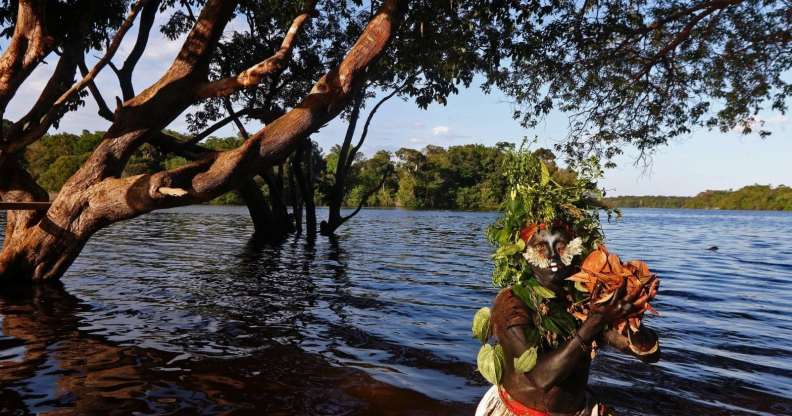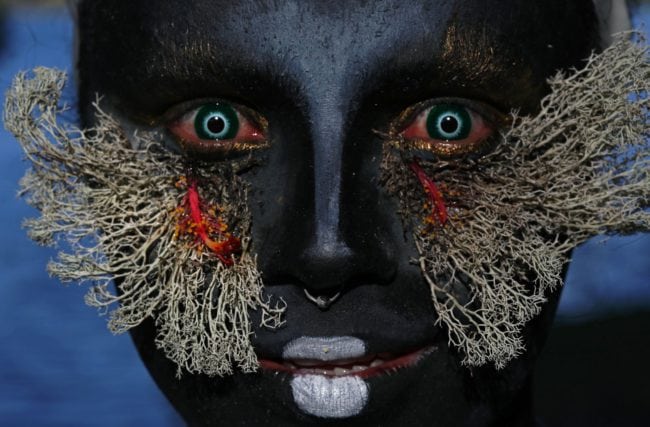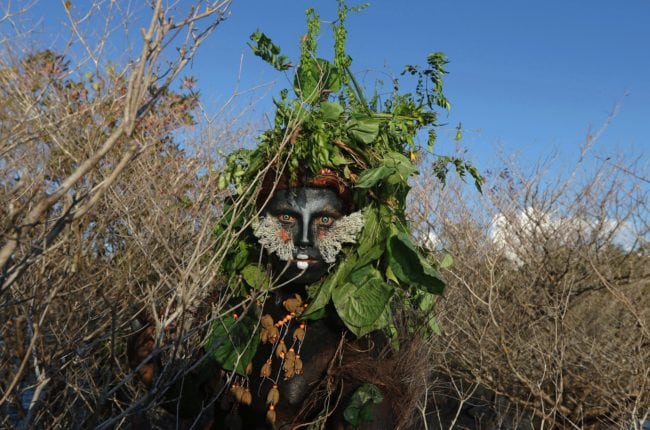Meet the Brazilian drag queen teaching Amazon villagers about conservation

Artist and activist Emerson Munduruku is pictured as he teaches environmental conservation to children through his drag queen alter ego character Uyra Sodoma, at the Sustainable Reserve of Anavilhanas in the state of Amazonas in northern Brazil, on July 21, 2018. – Emerson’s drag character requires two hours of preparation and all the materials he uses are collected from nature – never using the same costume twice. He’s a descendent of the Munduruku indigenous tribe from the Brazilian Amazon and travels to remote communities to teach children about the importance of the environment. (Photo by RICARDO OLIVEIRA / AFP) (Photo credit should read RICARDO OLIVEIRA/AFP/Getty Images)
A Brazilian drag queen is travelling around Amazon villages with a novel way of teaching about conservation—through performance art.
Emerson Munduruku, a 27-year-old biologist of indigenous descent who was born in the Amazon, transforms into Uyra Sodoma to show locals and children how to protect the planet.
“In a time of change, I had wanted to work in environmental protection. I was doing it from a scientific perspective but I realised it was also important from a social perspective. Until then, Uyra had no face or name,” he told AFP.
Uyra takes two hours to get ready and only uses materials from nature.
“Fundamental to the project is using the jungle as both an inspiration and a tool. This helps to connect people to the forest,” he said.
“Uyra is always met with either enchantment or fear… in cities, those who are enchanted approach to speak. But in the villages even those who are afraid approach. There’s no distance, it’s more spontaneous.

Uyra Sodoma requires two hours of preparation and all the materials used are collected from nature (RICARDO OLIVEIRA/AFP/Getty Images)
“It’s the same with children, they’re curious so they approach.”
Munduruku said he decided to start his journey as an eco-warrior drag queen in 2015, after he suffered a homophobic assault in the city of Manaus, the capital of the state of Amazonas.
“I’d spent six years of my life studying frogs and lizards… and one day I was hit coming out of a bar because I was wearing lipstick and eyeliner,” he said.
“That violence rocked me to my core…” he recalled, describing how the experience encouraged him to get in touch with the LGBT+ community and understand more about racism and homophobia, adding: “I became closer to the city and the people.”
“Uyra has given me a new lease on life. She makes me happy. She makes me more comfortable in my skin and with other people, as well as with my desires and concerns.”

Artist and activist Emerson Munduruku teaches villages about conservation (RICARDO OLIVEIRA/AFP/Getty Images)
Research published earlier this year found violent deaths of LGBT+ people in Brazil have reached an all-time high.
According to a report by human rights group Grupo Gay de Bahia, there were 387 murders and 58 suicides of LGBT+ people in 2017, marking a 30 percent increase on the previous 12 months.
Luiz Mott, the president of Grupo Gay de Bahia, said that the rising levels of violence were partially caused by the growth and publicity of ultra-conservative politicians.
Jurema Werneck, executive director at Amnesty International Brazil, said that although the country has aimed to introduce protections for vulnerable LGBT+ people, these proposals have often failed.
“In the last decade Brazil looked to produce policies that could protect vulnerable groups like gay and trans people but they mostly failed, due to lack of investment or change in vision of policy,” she said.

